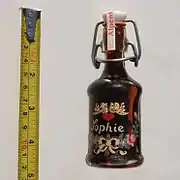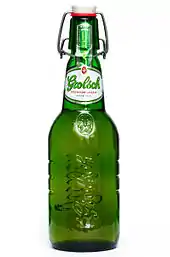Flip-top
A flip-top, swing-top, or Quillfeldt stopper (after the inventor, Charles de Quillfeldt) is a type of closure frequently used for bottles containing carbonated beverages, such as beer or mineral water. The mouth of the bottle is sealed by a stopper, usually made of porcelain or plastic, fitted with a rubber gasket and held in place by a set of wires. The bottle can be opened and resealed repeatedly and without the use of a bottle opener, with the wires acting in the same way as a latch clamp. The flip-top was the dominant method of sealing beer and mineral water bottles prior to the invention of the crown cork.


This is sometimes called a bail closure.
History
Prior to the creation of the flip-top bottle, bottles were often made from blown glass and sealed with a cork, which was difficult to open by hand and often unreliable, particularly for carbonated beverages such as mineral water or beer.

A precursor to the flip-top, the "bail" or "Kilner" closure was invented in 1859, where a lid with gasket was held by a wire harness and sealed by a separate set of wires.

The first flip-top closure was created by Charles de Quillfeldt in the United States, who filed for a patent on 30 November 1874, receiving patent number 158406.[1][2] The rights were purchased by Henry W. Putnam who adapted the design for use on fruit jars. He received a patent 25 April 1882, called "Trademark Lightning" and the jars became known as the lightning jars.[3] Several other varieties have been developed. [4]
Gallery
- Various flip-top closures
 Preserving jar with bail closure, opened and closed
Preserving jar with bail closure, opened and closed Flip-top seal used for crown cork bottles
Flip-top seal used for crown cork bottles Flip-top beer bottles
Flip-top beer bottles Mini bottle of herbal liqueur
Mini bottle of herbal liqueur Pottery jug with bail closure
Pottery jug with bail closure Aluminum flip-top bottle
Aluminum flip-top bottle Large beer bottle with flip-top
Large beer bottle with flip-top Unopened Grolsch beer bottle
Unopened Grolsch beer bottle
References
- 158406, Quillfedlt, "Improvement in Bottle-Stoppers", published 1875
- Putnam and another v. von Hofe. 10 February 1881 in: Federal Reporter, Nr. 6, pp. 897-902
- "Lightning jars"- Retrieved 2017-09-08
- US603724A, Romme, "Improvement in Bottle-Stopper", published 1898
Further reading
| Wikimedia Commons has media related to Swing-top closures. |
- Yam, K.L., "Encyclopedia of Packaging Technology", John Wiley & Sons, 2009, ISBN 978-0-470-08704-6